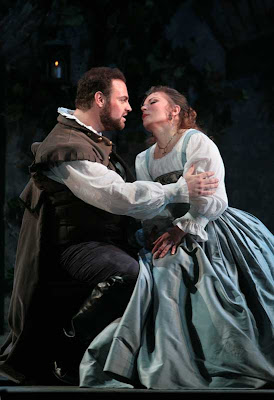 Carlos Álvarez as Rigoletto, Washington National Opera, 2008, photo by Karin Cooper |
Still, the play was regarded as dangerously revolutionary, because it directly concerned the sexual peccadilloes of the great Renaissance king of France, François I, in whom Hugo was really criticizing Louis-Philippe. Verdi had to mollify the imperial censors in Venice by recasting the noble philanderer as the Duke of Mantua, rather than a king, but it was not Hugo's title character who most interested Verdi and Piave. It was the court jester, Triboulet, who became the center of this opera, named for his Italian counterpart, Rigoletto (the initial working title of the opera was La Maledizione, referring to the curse Monterone places on Rigoletto). Of course, the ban on Hugo's play had ensured that it was widely read, if not staged for many years. Eventually, Verdi's operatic adaptation was performed repeatedly in Paris, while the Hugo play was still officially banned, although everyone knew that the opera was based on Hugo's play.
Rigoletto is an audience favorite, and the company has lately been reviving it about every eight or nine years (the last productions were in 1999 and 1991). It does require a serious cast, which for the most part this one is, beginning with baritone Carlos Álvarez, who was vocally puissant and dramatically gripping in the title role. The character is a study in contradictions, which is part of what makes him so endlessly fascinating: Hugo said that Triboulet was so protective of his daughter because he himself was such an evil man and knew evil intimately. Piave's libretto (in English translation) and Verdi's score present him also as a flawed but vulnerable father, in spite of his faults, and in any case, we cannot possibly sympathize with the callous Duke and his amoral court.
 Joseph Calleja (Duke of Mantua) and Lyubov Petrova (Gilda) in Rigoletto, Washington National Opera, 2008, photo by Karin Cooper |
The other noteworthy performance was the truly terrifying Sparafucile of Andrea Silvestrelli, a bass gigantic of both stature and squillo, whom we last reviewed as Sarastro in Santa Fe. Conductor Giovanni Reggioli, formerly the head coach and music administrator for the WNO Domingo-Cafritz Young Artist Program from 2001 to 2004, presided over a competent performance from the orchestra. Some good solo work was heard from the flute section (Caro nome), the melancholy English horn (Miei signori, perdono, pietate in Act II), and the oboe. Reggioli also did well at restraining the male chorus's tendency to rush, although misalignments of ensemble abounded in Act I.
Anne Midgette, WNO's 'Rigoletto': Needs Direction (Washington Post, March 31) T. L. Ponick, This 'Rigoletto' a charmer (Washington Times, March 31) |
Rigoletto runs through April 13, with two overlapping casts. See my review of the B cast in the Washington Post (April 3).
My taste runs to contemporary opera so I'm definitely not conservative nor exactly a big fan of the classical opera repertoire. I thoroughly enjoyed Malfitano's production of Rigoletto, but I especially appreciate what you said here about whether Malfitano provided any new ideas. I guess Anne Midgette meant to say something like this in her Washington Post review that panned Catherine Malfitano's direction.
ReplyDeleteThat is exactly what Anne Midgette was saying in her review, and I agree. Are you going up to New York for Satyagraha?
ReplyDelete